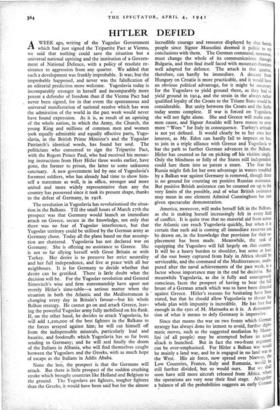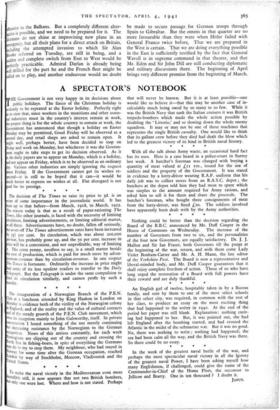HITLER DEFIED
AWEEK ago, writing of the Yugoslav Government which had just signed the Tripartite Pact at Vienna, we said that nothing could save the situation but a universal national uprising and the institution of a Govern- ment of National Defence, with a policy of resolute re- sistance to aggression from any quarter. We added that such a development was frankly improbable. It was; but the improbable happened, and never was the falsification of an editorial prediction more welcome. Yugoslavia today is incomparably stronger in herself and incomparably more potent a defender of freedom than if the Vienna Pact had never been signed, for in that event the spontaneous and universal manifestation of national resolve which has won the admiration of the world in the past week would never have found expression. As it is, as result of an uprising of the whole nation, in which the Army, the Church, the young King and millions of common men and women took equally admirable and equally effective parts, Yugo- slavia, in the British Prime Minister's and the Yugoslav Patriarch's identical words, has found her soul. The politicians who consented to sign the Tripartite Pact, with the Regent Prince Paul, who had received his menac- ing instructions from Herr Hitler three weeks earlier, have gone, the former to prison, the latter to some unknown sanctuary. A new government led by one of Yugoslavia's foremost soldiers, who has already had time to show him- self a statesman as well, is in office, stronger and more united and more widely representative than any the country has possessed since it took its present shape, thanks to the defeat of Germany, in 1918.
The revolution in Yugoslavia has revolutionised the situa- tion in the Balkans. Till the small hours of March 27th the prospect was that Germany would launch an immediate attack on Greece, secure in the knowledge, not only that there was no fear of Yugoslav interference, but that Yugoslav territory could be utilised by the German army as Germany chose. Today all the plans based on that assump- tion are shattered. Yugoslavia has not declared war on Germany. She is offering no assistance to Greece. She is not so far allying herself with Great Britain or with Turkey. Her desire is to preserve her strict neutrality and her full independence, and live at peace with all her neighbours. It is for Germany to decide whether that desire can be gratified. There is little doubt what the decision will be. For the Yugoslav revolution and General Simovitch's wise and firm statesmanship have upset not merely Hitler's time-table—a serious matter when the situation in both the Atlantic and the Mediterranean is - changing every day in Britain's favour—but his whole Balkan strategy. He cannot go on and attack Greece, leav- ing the powerful Yugoslav army fully mobilised on his flank. If, on the other hand, he decides to attack Yugoslavia, he will add 1,200,000 of the best fighters in the Balkans to the forces arrayed against him; he will cut himself off from the indispensable minerals, particularly lead and bauxite, and foodstuffs which Yugoslavia has so far been sending to Germany; and he will seal finally the doom of the Italians in Albania, who will find themselves caught between the Yugoslays and the Greeks, with as much hope of escape as the Italians in Addis Ababa.
None the less, the prospect is that the Germans will attack. But there is little prospect of the sudden crushing stroke which brought countries like Holland and Belgium to the ground. The Yugoslays are fighters, tougher fighters than the Greeks, it would have been said but for the almost incredible courage and resource displayed by that heroic people since Signor Mussolini deemed it politic to try conclusions with them. The German command, moreover, must change the whole of its communications through Bulgaria, and then find itself faced with mountain-frontiers well adapted for defence. The attack in that quarter, therefore, can hardly be immediate. A descent from Hungary on Croatia is more practicable, and it would have an obvious political advantage, for it might be necessary for the Yugoslays to yield ground there, as they had to yield ground in 1914, and the strain in the always rather qualified loyalty of the Croats to the Triune State would be considerable. But unity between the Croats and the Serbs today seems complete. If war is forced on Yugoslavia she will not fight alone. She and Greece will make com- mon cause, and Signor Ansaldo will have reason to utter more " Woes " for Italy in consequence. Turkey's attitude is not yet defined. It would clearly be to her own best interest, as Mr. Eden can hardly fail to impress on her, to join in a triple alliance with Greece and Yugoslavia to bar the path to further German advances in the Balkans, Hitler has counted so far on picking off his victims singly. Only the blindness or folly of the States still independent could lure them into so patent a snare. The fear that Russia might fish for her own advantage in waters troubled by a Balkan war against Germany is removed, though there is no ground for counting on positive Russian assistance. But positive British assistance can be counted on up to the very limits of the possible, and of what British assistance may mean in one element Admiral Cunningham has just given spectacular demonstration.
America, moreover, will make herself felt in the Balkans, as she is making herself increasingly felt in every field of conflict. It is quite true that no material aid from across the Atlantic can reach Yugoslavia quickly, but when it is certain that such aid is coming all immediate reserves can be drawn on, in the knowledge that provision for their re- placement has been made. Meanwhile, the task of equipping the Yugoslays will fall largely on. this country. It will be a heavy burden to shoulder, but some at least of the vast booty captured from Italy in Africa should be serviceable, and the command of the Mediterranean, undis- puted after the naval achievements of the past week, is a factor whose importance may in the end be decisive. But meanwhile Yugoslavia, as she is fully and courageously conscious, faces the prospect of having to bear the full brunt of a German attack which was to have been directed against Greece. Hitler's reasons for hesitating have seen stated, but that he should allow Yugoslavia to thwart his whole plan with impunity is incredible. He has lost faze enough in the eyes of M. Matsuoka as it is. A demonstra- tion of what it means to defy Germany is imperative.
Since that means the war on two fronts which German strategy has always done its utmost to avoid, further diplo- the West. His air force, now spread over Norway, Musso- matic moves, such as the suggested mediation by lini (of all people) may be attempted before an actual attack is launched. But in fact the two-front argument can be over-emphasised. For Hitler a Balkan war would be mainly a land war, and he is engaged in no land war in the Low Countries, France, Italy and Rumania, would be still further divided, but so would ours. But we shall soon have still more aircraft released from Africa. where the operations are very near their final stage. Altogether a balance of all the probabilities suggests an early German nsive in the Balkans. But a completely different alter- dye is possible, and we need to be prepared for it. The mans do not shine at improvising new plans in an ergency, but all their plans for a direct attack on Britain, luding the attempted invasion to which Sir Alan woke referred on Tuesday, are still in being, and a udden and complete switch from East to West would be rfectly practicable. Admiral Darlan is already being ell drilled for. the part he and the French fleet might be ed on to play, and another endeavour would no -doubt be made to secure passage for German troops through Spain to Gibraltar. But the omens in that quarter are no more favourable than they were when Hitler failed with General Franco twice before, That we are 'prepared in the West is certain. That we are doing everything possible in the East is sufficiently testified by the fact that General Wavell is in supreme command in that theatre, and that Mr. Eden and Sir John Dill are still conducting diplomatic and military discussions there. The beginning of April brings very different promise from the beginning of March.



























 Previous page
Previous page